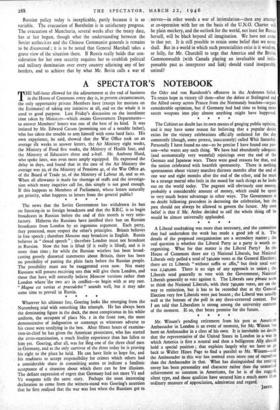Whatever his ultimate fate, Goering looks like emerging from the
Nuremberg trial with something like triumph. He has always been the dominating figure in the dock, the most conspicuous in his white uniform, the occupant of place No. I in the front row, the most demonstrative of indignation or contempt as witnesses adverse to his cause were testifying in the box. After fifteen hours of examina- tion-in-chief he has given the American prosecutor, who has started the cross-examination, a much livelier experience than has fallen to him yet. Goering, after all, was for %rig one of the three chief men in Germany, and as the only survivor of the three today he is proving his right to the place he held. He can have little to hope for, and his readiness to accept responsibility for crimes which others had a considerable share in committing seems to indicate a fatalistic acceptance of a situation about which there can be few illusions. The defiant expression of regret that Germany had not more VI and V2 weapons tells the same story. Perhaps the most interesting declaration to come from the witness-stand was Goering's assertion that he first realised that the war was lost when the Russians got to
the Oder and von Rundstedt's offensive in the Ardennes failed. To retain hope in victory till then—after the defeat at Stalingrad and the Allied sweep across France from the Normandy beaches—argues considerable optimism, but if Germany had had time to bring more secret weapons into play almost anything might have happened.
* * *






























 Previous page
Previous page